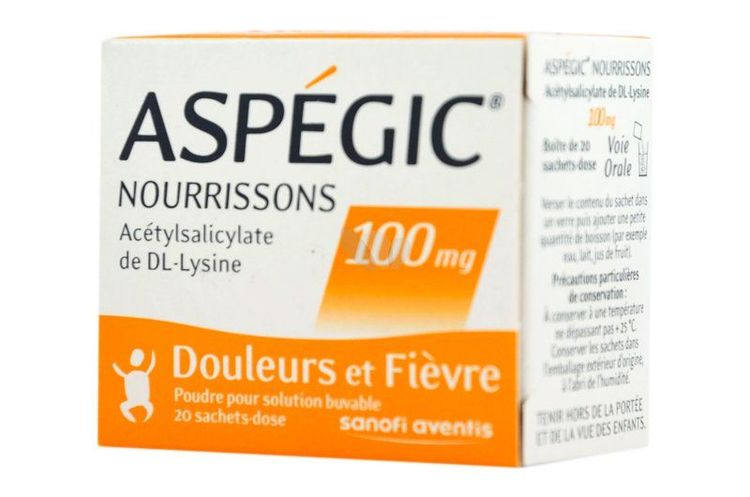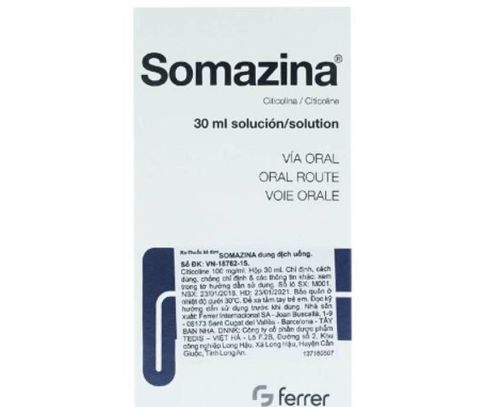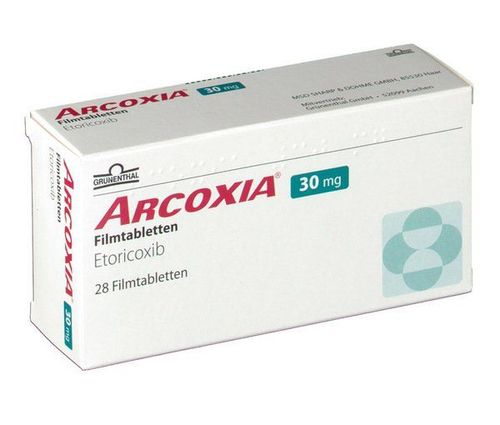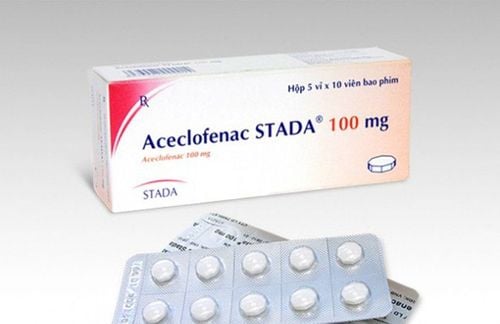Aspegic is manufactured by the multinational pharmaceutical company Sanofi (France). The drug is commonly used in the secondary prevention of stroke, myocardial infarction, and particularly in treating mild to moderate pain, helping reduce fever and inflammation.
1. What are the effects of Aspegic 100mg?
Aspegic is formulated as a powder for oral solution or injection powder with various dosages including: 100mg, 500mg, 1000mg.
Aspegic's main component is Lysine acetylsalicylate, a derivative of acetylsalicylic acid (Aspirin). This active ingredient belongs to the non-steroidal anti-inflammatory drugs (NSAIDs) group, thus it is indicated for the following cases:
• Pain relief (treatment of mild to moderate pain symptoms);
• Anti-inflammation and joint conditions such as: rheumatoid arthritis, short-term back pain;
• Fever reduction, headache relief, fatigue;
• Treatment and prevention of heart attacks, strokes, angina;
Note: Patients should only use Aspegic when prescribed by a doctor.
2. Instructions for use: Aspegic
Aspegic can be administered through two main routes: oral and intravenous injection.
For oral Aspegic 100mg, users should dissolve the powder in water before taking. Each dose should be taken at least 4 hours apart with the following dosages:
• Children: Take 25-50mg/kg/day, divided into multiple doses throughout the day. Maximum dose 80mg/kg/day (for children <30 months old) and 100mg/kg/day (for children from 30 months - 15 years old);
• Adults: Take 500-1000mg/dose, divided into 2-3 times, maximum dose 3g/day;
• Elderly: Take 500-1000mg/dose, maximum 2g/day;
• Rheumatic patients: Take a maximum 6g/day.
How to use injectable Aspegic: For injection form, users can inject directly or mix Aspegic with suitable solvents such as: Glucose solution, NaCl solution.

3. Side effects of Aspegic
Some side effects that users may experience when using Aspegic include:
• Tinnitus, headache, hearing loss (usually occurs with overdose);
• Feeling discomfort in the stomach or lower chest area after eating;
• Gastritis, gastric-duodenal ulcers
• Symptoms of gastrointestinal bleeding, such as bloody stools, vomiting blood... or potential risk of iron deficiency anemia;
• Swelling (rare);
• Hemorrhage conditions (nosebleeds, gum bleeding, purpura), easy bruising with increased bleeding time. This effect can last 4-8 days after stopping Aspirin, causing risk of hemorrhage during surgery.
• Hypersensitivity reactions such as: hives, Quincke's edema, asthma, anaphylactic reactions.
4. Precautions when using Aspegic
When combining Aspegic with antiplatelet drugs, it may lead to an increased risk of bleeding. Therefore, when deciding to use it, careful monitoring of the user's health is necessary.
Aspegic 100mg is contraindicated for these patients:
• Those with progressive gastric-duodenal ulcers;
• Those at risk of allergies to salicylate derivatives and related active substances, especially NSAIDs;
• Those with constitutional or acquired bleeding disorders, leading to high risk of hemorrhage;
• Pregnant women and nursing mothers, children under 1 year old;
• Those with asthma, kidney failure.

5. Drug interactions with Aspegic
Some drugs that may interact when combined with Aspegic 100mg include:
• Methotrexate;
• Heparin;
• Other non-steroidal anti-inflammatory drugs (NSAIDs);
• Anticoagulants;
• Ticlopidine;
• Benzbromarone, probenecid;
• Diabetes medications
• Corticosteroid.
The above article has provided necessary information about Aspegic 100mg. Readers should note that the drug product information is for reference only. Therefore, to ensure treatment effectiveness, users should consult additional professional opinions from doctors.
To arrange an appointment, please call HOTLINE or make your reservation directly HERE. You may also download the MyVinmec app to schedule appointments faster and manage your reservations more conveniently.
To arrange an appointment, please call HOTLINE or make your reservation directly HERE. You may also download the MyVinmec app to schedule appointments faster and manage your reservations more conveniently.








